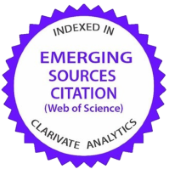Submissions
Submission Preparation Checklist
All submissions must meet the following requirements.
- The authors must submit the papers through the journal platform.
- The papers must be prepared according to the sample template. The sample template for the authors is available in the Submission section.
- The authors must send (upload with the submission) the signed Author declaration and statement of copyrights/related rights (available in the Submission section).
- The submission has not been previously published, and it is not considered to be published by another journal.
- The article does not exceed the set length.
- URLs for the references have been provided where available.
- Only visual data, images, etc. ,over which the author(s) have copyright are used unless permission has been obtained and acknowledged.
- The citations are in APA style according to the Guidelines for Authors.
- The article has been proofread and corrected for errors.
- The Scientific paper consists of an Abstract, Keywords, JEL Classification, Introduction, Literature review, Methodology, Results and Discussion, Conclusion, References, and a Brief description of Author/s.
- The text is formatted according to the Guidelines for the Authors (see template).
Scientific Papers
The scientific paper is a written and published report describing original research results. A well-written scientific paper explains the scientist's motivation for providing a research, the research design and execution, and the meaning of the results. Scientific papers are written in a style that is exceedingly clear and concise. Their purpose is to inform an audience about an important issue and to document the particular approach they used to investigate that issue.
If English is not the researcher’s first language, then proofreading by a native speaker might be helpful.
Copyright Notice
Journal of Tourism and Services (ISSN 1804-5650) is published by the Center for International Scientific Research of VŠO and VŠPP in cooperation with the following partners:
- Juraj Dobrila University of Pula, Faculty of Economics and Tourism, Croatia
- School of Business and Administration of the Polytechnic Institute of Setúbal, Portugal
- Szent István University, Faculty of Economics and Social Sciences, Hungary
- Pan-European University, Faculty of Business, Prague, Czech Republic
- Pan-European University, Faculty of Entrepreneurship and Law, Prague, Czech Republic
- University of Debrecen Faculty of Economics and Business, Hungary
- University of Zilina, Faculty of Operation and Economics of Transport and Communications, Slovakia
No part of this journal may be reproduced or transmitted in any form or by any means, electronic or mechanical, including photocopying, recording, or by any information storage retrieval system, without permission from the authors.
Copyright belongs to the Center for International Scientific Research of VŠO and VŠPP. All rights reserved.
The publisher provides a free access policy to the Journal of Tourism and Services.
Privacy Statement
The names and email addresses entered in this journal site will be used exclusively for the stated purposes of this journal and will not be made available for any other purpose or to any other party.




